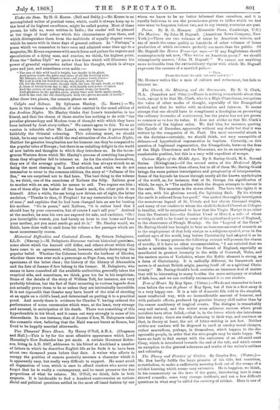Caliphs and Sultans. By Sylvanus Hanley. (L. Reeve.) —We have
in this volume a collection of tales omitted in the usual edition of the Arabian Nights. Mr. Hanley thinks that Lane's translation is too literal, and that the charm of these stories has nothing to do with "the peculiar phraseology and Moslem tone of thought with which they have been imbued by Arab story-tellers." We cannot agree to this. To us no version is tolerable after Mr. Lane's, exactly because it preserves so faithfully tho Oriental colouring. This colouring must, we should think, be to any one but a child the real attraction of the Arabian Nights. Neither for genuine imagination nor for humour can they be compared to the popular tales of Europe ; but there is an unfailing delight in the world of new habits and thoughts to which they introduce us. In the incon- gruous Western dress which Mr. Hanley's process of rewriting has given them they altogether fail to interest us. As for the stories themselves, they are of the average quality. That which has always struck us as being the most charming in Lane's collection, and which we do not remember to occur in the common editions, the story of "Jullanar of the Sea," we are surprised not to find here. The best thing in the volume is, we think, one of the anecdotes of Xailoun the Silly. Xailoun goes to market with an ass, which he moans to sell. Two rogues see him ; one of them slips the halter off the beast's neck, the other puts it on himself. After a while, the ass being now driven out of sight, the latter exclaims, "Thanks to thee, 0 Prophet! for my restoration to the shape of man ;" and explains that he had been changed into an ass for heating his mother. "Go in peace," said Xailoun, "it is rather hard that I should lose by your conversion, but of course I can't sell you." Arrived at the market, he sees his own ass exposed for sale, and exclaims, "Oh ! you incorrigible wretch, you had barely an hour to run home and beat your mother, yet you must needs go and do it." Mr. Hanley would, we think, have done well to omit from his volume a few passages which are moat unnecessarily coarse.






























 Previous page
Previous page